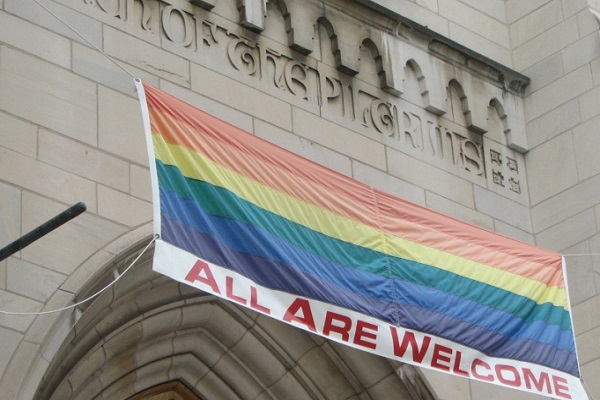
Yes, You Can Be a Gay Christian
- By Kelly Frazier --
- 29 Jul 2017 --
![By Drama Queen (Church of the Pilgrims) [CC BY 2.0], via Wikimedia Commons](http://www.worldreligionnews.com/wp-content/uploads/2017/07/Gay_friendly_church.jpg)
You Can Love Who You Want and God
Being LGBT+ in the United States comes with a laundry list of inequalities, all at a systemic, institutional level. However, it’s especially isolating for Christian LGBT+ people to be exiled from their churches for nothing but having same-sex attraction – the very same communities that promise to support them, encourage them, and love them unconditionally.
Interestingly, while there has been a steep decline in the number of Americans who identify as Christian, the number of LGBT+ Americans who identify as Christian only continues to climb. In fact, more LGBT+ Americans identify as Christian than ever before – to be specific, nearly half, 48%, do. And yet, we are a population that the Church and general public continues to ostracize and ignore.
The majority of people still seem to be under the impression that being LGBT+ and Christian is mutually exclusive – that the Christian faith and LGBT+ identity are inherently at odds. However, most modern interpretations of the Bible directly clash with this mentality. Bible passages that were previously interpreted to state that homosexuality is a sin are now being reexamined, with the integration of vital cultural contexts.
To name a few, in Genesis 19, the story of Sodom and Gomorrah condemns the homosexual relations taking place, not because they’re homosexual, but because the sexual relations taking place were an attempted rape.
In Leviticus 20, the scripture where the Bible states that it is an abomination if a man lays with another man occurs in what is called “The Holiness Code”, which was meant to construct laws to ensure that Israel would remain distinct from other, surrounding cultures. Specifically, this rule was meant to set the Israelites apart from the Canaanites and Egyptians, who would perform homosexual sex in their temples during fertility rites. Same sex relations were seen to mix the roles of men and women, and such “mixing of kinds” were seen to be an abomination, just as mixing different kinds of seeds were seen to be an abomination.
@kennywin2011 Kenny, God made you gay and loves you just that way. The Church often makes mistakes; God NEVER does. https://t.co/B3g9BsJskK
— Gene Robinson (@BishopGRobinson) August 22, 2015
In Romans 1, when Paul condemns shameful lusts, he is explicitly is referencing to people who searched for pleasure by having sex with anyone available, or used methods not culturally accepted. In surrounding cultures, men of higher statuses often took sexual advantage of male slaves or male prostitutes. Therefore, Paul is instructing his readers to keep sexually pure and to honor God, and talks about the use and misuse of power and authority and how that impacts one’s relationship with God – he doesn’t say that monogamous, committed homosexual relationships in and of themselves are sinful.
LGBT+ Christians aren’t exempt from the same standards that heterosexual Christians are held to – promiscuity and adultery are still denounced. However, the Bible makes no references to committed, monogamous homosexual relationships whatsoever, and especially makes no references suggesting that such relationships are inherently sinful solely because the sexes of both parties involved is the same.
At best, it’s irresponsible to take the Bible’s passages about homosexuality at such face value, when most Christians recognize that, due to cultural implications, many rules and regulations of the past no longer apply to us in the present. At worst, the homophobic rhetoric that the Church often utilizes turns members of the LGBT+ community away from God.
Here’s the thing about God that a lot of people tend to forget: the God that Christians believe in is an omnipresent, all-knowing God. As Christians, we recognize the fact that God knows us better than we know ourselves, and that God has known everything about us from the moment He created us. Knowing this, it’s almost ridiculous to assume that we somehow shocked or disappointed God by realizing we’re LGBT+. It’s not as if God didn’t already know about this integral part of ourselves before even WE knew. It’s not as if God didn’t create us exactly as we are, loving every aspect of us.
Thankfully, there is indication that this understanding is entering the status quo. More and more churches are becoming inclusive to LGBT+ believers – amongst them are the Presbyterian Church, the Episcopal Church, the Evangelical Lutheran Church, and the United Church of Christ.
At the end of the day, God left His believers few duties on Earth as His creations – to love Him with all our heart and with all our soul and with all our mind, to love each other as we love ourselves, and to spread the message of His love to all corners of the Earth. That’s what comprises our identity as Christians – not our sexualities.




















